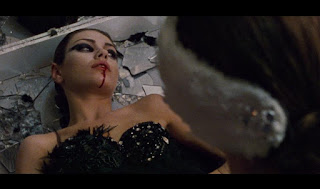It's a bad sign when I watch a horror
movie and my first thought is how badly the romance is written. I
have literally no idea why Anton (Devon Sawa) and Molly (Jessica
Alba) end up together. It doesn't even qualify as a male fantasy,
since those usually require the man to do something impressive to
secure a romantic interest. Anton grabs her ass while under the
control of his demonic hand, and she's suddenly into him.
I like horror comedy, and this is a
film that has plenty of laughs. It actually avoids the End of
Days mistake of assuming that
supernatural forces work on whatever time zone they're in. That
said, the film fails when it tries to go into horror movie territory,
mainly because it's entire premise makes the most blatantly useless
character our protagonist.
Anton is a stoner
teenager, possessed by an evil force that takes control of the hand
of incredibly lazy people. I somewhat suspect they came up with a
title, and then a story. Under the influence of his hand, Anton
begins committing murders. He's initially unaware that he's doing
this (presumably carrying out the murders in his sleep), but he
eventually realizes the truth, and his hand begins to act more
openly.
He also kills his
fellow stoner friends, Mick and Pnub (Seth Green and Elden Henson),
who come back as zombies. The explanation is simply that they chose
not to go to heaven. Why they're the first of countless billions to
just decide they prefer Earth I have no clue. Especially since they
go to heaven at the end of the film anyway, simply becoming Anton's
guardian angels.
Also, in a side
plot a druid named Debi (Vivica A. Fox) is hunting for the
hand-possessing force. This goes nowhere. She shows up at the very
end to finish the hand off, but she doesn't even bother with any
exposition explaining what it is. If you're going to leave the
supernatural force unexplained, then don't put a Van Helsing in the
film at all!
Literally any of
these other characters would be a better protagonist than Anton.
Even the other stoners are, at minimum, witty and charming. I'm not
sure if my dislike for Anton is due to the character or the actor
lacking charisma. The character is shown to be so lazy that doesn't
notice his parents missing for four days, and is reluctant to get up
from the couch even to get more weed.
Mick and Pnub
openly criticize him for his complete lack of goals in life. Whether
this is intentionally a more optimistic portrayal of stoners, or a
commentary on how lazy Anton is I don't know. Either way, the point
is clear: Seth Green stoned off his ass would be a better hero.
Even Molly, who
doesn't know about the evil forces for most of the movie, is shown to
be clever and resourceful when running from them. But, Anton's the
hero, so he has to save her. Then, he gets crushed by a car, and
turns down heaven himself to be with Molly.
I'll say this: the
make-up is good. Seth Green spends most of the movie with a bottle
embedded in his skull, and Henson has to carry his own head around.
When something violent or bloody happens, it looks pretty good. And
about half the jokes hit home.
That said, it's not
a film I'd recommend going out of your way to see. And it hits home
far better as a comedy than as horror. That's not to imply that it
does especially well as either.


